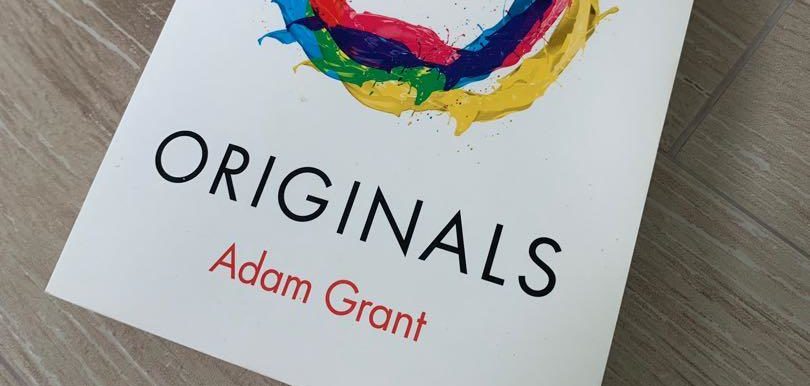
Aside from the fact that Warby Parker has had this book proudly displayed in their bookcases for as long as I can remember (and if you read this book, you'll know why), I was seeking inspiration for originality so this seemed fitting.
I was able to breeze through this audiobook in about a week, so it's safe to say it's easily digestible and filled with great research, data points and conclusions that aren't just assumptions but are truly backed by literally years of research from numerous human behavioral experts.
My biggest takeaways from this book include:
- Don't be afraid to challenge the status quo.
- Take calculated risks.
- Know that success can still (and often does) follow significant "failures."
- "Failures" are just opportunities to learn.
- People can "fail" hundreds of times, but it's often the one major success that people remember.
But Adam does a great job in recapping his key points throughout the book with this lovely list:
- Question the default. Don't' accept the status quo. Rules and systems were created by people and there's always room for improvement.
- Triple the number of ideas you generate. Every innovator swings and misses.
- Immerse yourself in a new domain. Get outside your comfort zone: skillsets, job roles, hobbies, cultures, you name it.
- Procrastinate strategically. Stop in the middle of brainstorming, it supports divergent thinking, allowing more time for ideas to grow.
- Seek feedback from peers. Better positioned to spot potential and possibilities.
- Balance your risk portfolio. Offset your risks by being overly cautious in other areas of your life.
- Highlight the reasons not to support your idea. It puts people at ease right off the bat. When people have to work to say why they wouldn't support it, it helps them realize all the reasons they should.
- Make your ideas more familiar. Repeat ideas that are more unconventional, 10-20 exposures is ideal. You can also associate your new ideas with something more familiar to help people better accept it.
- Speak to a different audience. Try approaching disagreeable people who share your methods, not those who are likely to agree with your ideas. Best allies are those who will be tough but solve problems with similar approaches you take.
- Be a tempered radical. Position extreme ideas in traditional goals.
- Motivate yourself differently when committed versus uncertain. When you're committed, look at the progress still to come. When you're conviction falters, think about how far you've already come.
- Don't try to calm down. Turn anxiety into excitement and enthusiasm.
- Focus on the victim, not the perpetrator. Focusing on the perpetrator fuels anger and aggressive. Focusing on the victim fuels empathy and increases the likelihood of channeling yoru energy in a more positive way.
- Realize you're not alone. Even a single ally can make a difference.
- If you don't take initiative, the status quo will continue to exist.
- Include diverse talents to provide solutions to all problems.
- Ban the words like, love, hate. They're too easy to say and vague to mask the true value of what we really mean to say.
- Hire on cultural contribution, not cultural fit. Hire those who enrich your culture, not those who look and act like everyone else.
- Ask for entry interviews, not exit interviews. Ask what brought them in and what would keep them.
- Ask for problems, not solutions. Problems encourage conversation. Solutions are one-sided dialogue.
- Welcome criticism. It allows for more open interactions.
- Ask children what their role models would do. Adults could take a lesson from this book too.
- Link good behaviors to moral character. Focus on being a helpful person, not helpful actions.
- Explain how bad behaviors have consequences for others. Feel empathy and guilt. rights wrongs and avoid future behavior.
- Empahsize values over rules. Children can internalize principles to exemplify values.
- Create novel niches. Use storylines to find new empathetic perspectives.

Kiley Executive Coach & Consultant
Kiley Peters is a serial entrepreneur, national speaker, executive coach, and small business consultant. Having personally counseled over 100 small and medium-sized businesses on operations, business development, digital marketing, and consumer behavior analysis over the last 17 years Kiley is incredibly passionate about serving small business owners. She is the Founder and CEO of Brainchild Studios, a research and business strategy partner for small businesses and mid-market executives, and also created the Work From Home Playbook, a series of online courses guiding aspiring entrepreneurs through the steps of starting a virtual business. With these experiences in her back pocket, she understands the challenges and struggles small business owners encounter.
more posts by Kiley →


